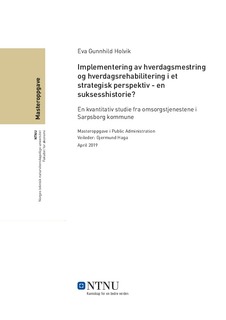| dc.description.abstract | Formålet med denne oppgaven er å belyse hva som hemmer eller fremmer ved implementering av hverdagsrehabilitering og hverdagsmestring i omsorgstjenestene i Sarpsborg kommune. Problemstillingen er utledet i syv forskningsspørsmål som retter fokuset mot organisasjonskultur, organisasjonslæring, mål (kommunikasjon) og kontrollsystemer. Oppgaven tar utgangspunkt i strategifaget og teorier om endringsledelse, nærmere bestemt den konseptuelle foretaksmodellen til Busch, Johnsen, Valstad og Vanebo (1993), samt teorier fra blant annet Lai og Kotter. Studien har en kvantitativ tilnærming og er basert på en spørreundersøkelse som ble besvart av ledere og ansatte februar 2019. Undersøkelsen oppnådde en svarprosent på 33 %. En bortfallsanalyse viste imidlertid små avvik i forhold til populasjonen. Det er supplert med andre forskningsstudier om samme tema som styrker muligheten for generalisering. I hovedtrekk indikerer resultatene at det er mye som fremmer i implementeringsprosessen. Funn antyder at ledelsessystemet har lykkes med å forankre strategien i atferdssystemet. Samtidig finner vi funn om målkonflikter mellom koalisjons- og atferdssystemene. Mål som påvirkningsfaktor vil trolig både hemme og fremme i implementeringsprosessen. Funn antyder at motivasjonsskapende tiltak har bidratt til endret organisasjonskultur. I så måte kan det tolkes som at organisasjonskulturen er en fremmende faktor. Funn om kontrollsystemer kan være en mulig hemmer, men det er nødvendig ikke gitt med tanke på arbeidsmetodikkens art. Her avdekkes trolig et dilemma for ledelsessystemet med henblikk på å finne riktig balansegang mellom behovet for å etablere kontrollsystemer som ivaretar motivasjon, forpliktelse, fokus på måloppnåelse og samtidig som det faglige handlingsrommet for ansatte sikres. Kontrollsystemer vil trolig både hemme og fremme. Til sist finner vi funn at det er tilrettelagt for organisasjonslæring, men trolig er det mindre tilrettelagt for delingskultur. Organisasjonslæring vil trolig både hemme og fremme. Basert på funn i denne undersøkelsen og tilsvarende forskningsrapporter kan det være nyttig å fokusere på gode arenaer for kompetanselæring og erfaringsutveksling i det videre arbeidet med implementeringen. Økt fokus på informasjonsarbeid kan muligens bidra til å redusere målkonfliktene mellom interessentene. Til sist handler det også om å finne gode kontrollsystemer som stimulerer til måloppnåelse som ivaretar alle interessentene. | |
| dc.description.abstract | The purpose of this study is to provide knowledge to what hinders or promotes implementation of reablement in Sarpsborg municipality. The thesis question is derived into seven research questions that focus on organizational culture, organizational learning, goals (communication) and control systems. The thesis is based on the strategy subject and theories about change management, including the conceptual business model of Busch, Johnsen, Valstad and Vanebo (1993), as well as theories from Lai and Kotter. The study has a quantitative approach based on a survey answered by managers and employees in February 2019. The survey achieved a response rate of 33%. However, a dropout analysis showed minimal deviations from the population. In addition, the thesis has been supplemented with other research studies on the same topic that can strengthen the possibility of generalization. Overall the findings indicates several promoting factors in Sarpsborg municipality. Findings suggest that the management system has succeeded in anchoring the strategy in the behavioral system, but at the same time we find findings on conflict of goals between the coalition and behavior systems. Goals will probably both inhibit and promote in the implementation process. Findings indicate that motivational measures have contributed to changed organizational culture, and at the same time, the changes have not led to uncertainty among employees. In this way, it can be interpreted as that the organizational culture is a stimulating factor. Findings about control systems may be a possible inhibitor, but it is not necessary given the nature of the working method. Here, a dilemma is probably uncovered for the management system with a view to finding the right balance between the need to establish adequate control systems that safeguard motivation, commitment, focus on goal achievement and at the same time ensuring the professional room for maneuver for employees. Control systems will probably both inhibit and promote. Finally, findings show that it is adapted for organizational learning, but probably it is less adapted for sharing culture. Organizational learning is likely to hamper and promote. In the further implementation process, it may be useful to focus on good arenas for competence learning and exchange of experience. Increased focus on information work may possibly help to eliminate the target conflicts between stakeholders. Finally, it is also about finding good control systems that stimulate goal achievement that safeguards all stakeholders. | |
